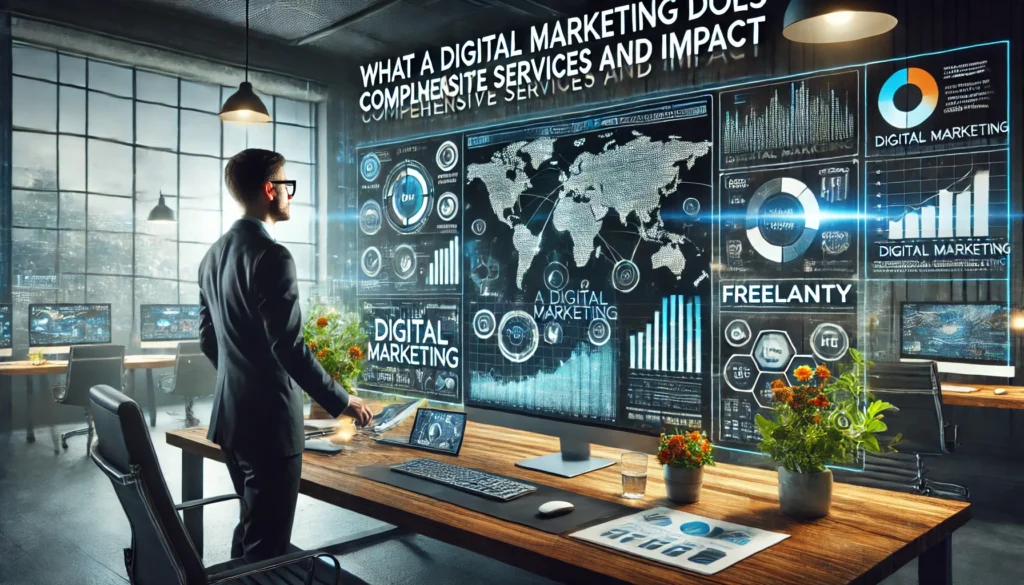

The Comprehensive Guide to Digital Marketing: Roles, Services, and Impact
Introduction
Digital marketing is an essential aspect of modern business strategies, encompassing a wide range of activities aimed at promoting products and services online. Understanding what digital marketing includes, the roles of digital marketing professionals, and the functions of a digital marketing agency is crucial for businesses looking to thrive in the digital age. This comprehensive guide explores these aspects in detail.
What Digital Marketing Includes
SEO (Search Engine Optimization)
SEO involves optimizing website content to rank higher in search engine results. It includes keyword research, on-page optimization, link building, and technical SEO. The goal is to increase organic traffic and improve search engine visibility.
Content Marketing
Content marketing focuses on creating and distributing valuable content to attract and engage a target audience. This can include blog posts, articles, videos, infographics, and more. The aim is to provide useful information that drives customer action and builds brand authority.
Social Media Marketing
Social media marketing uses platforms like Facebook, Instagram, Twitter, and LinkedIn to promote products and engage with customers. Strategies include creating engaging content, running paid advertisements, and interacting with followers to build a loyal community.
Email Marketing
Email marketing involves sending personalized emails to a targeted audience. It is effective for nurturing leads, promoting products, and maintaining customer relationships. Automated email campaigns can deliver timely and relevant content to subscribers.
PPC (Pay-Per-Click) Advertising
PPC advertising involves placing ads on search engines and social media platforms and paying a fee each time the ad is clicked. This model allows for precise targeting and quick results, making it a popular choice for driving traffic and conversions.
Analytics
Analytics tools track and analyze website traffic, user behavior, and campaign performance. Data collected from these tools helps marketers understand what works, make informed decisions, and optimize strategies for better results.
Web Design and Development
Web design and development ensure that a business’s website is user-friendly, visually appealing, and optimized for search engines. This includes designing the layout, coding, and ongoing maintenance to improve user experience and performance.
What Digital Marketing Executive Do
Role Overview
A digital marketing executive plays a critical role in developing and implementing online marketing strategies. They work closely with other marketing professionals to ensure campaigns align with business goals.
Key Responsibilities
Skills Required
What Digital Marketing Specialist Do
Role Overview
A digital marketing specialist focuses on specific areas of digital marketing, such as SEO, social media, or PPC. They bring specialized knowledge and skills to enhance marketing efforts in their area of expertise.
Key Responsibilities
Skills Required
What Digital Marketing Analyst Do
Role Overview
A digital marketing analyst collects and analyzes data related to marketing campaigns. Their insights help optimize marketing strategies and improve overall performance.
Key Responsibilities
Skills Required
What Digital Marketing Agency Does
Services Offered
Digital marketing agencies provide a wide range of services, including:
Client Engagement
Digital marketing agencies work closely with clients to understand their goals and develop tailored strategies. This involves regular communication, progress updates, and collaborative planning to ensure alignment with client objectives.
Measuring Success
Agencies use various metrics and analytics tools to measure the success of marketing campaigns. Key performance indicators (KPIs) include website traffic, conversion rates, click-through rates, and ROI. Regular reporting helps clients understand the impact of marketing efforts and make informed decisions.
How Digital Marketing Roles Work Together
Collaboration
Collaboration is essential in digital marketing. Executives, specialists, and analysts work together to develop and execute comprehensive marketing strategies. This synergy ensures that all aspects of digital marketing are aligned and optimized for success.
Workflow
A typical workflow in a digital marketing team involves several stages:
Impact on Business Growth
When digital marketing roles work seamlessly together, they drive significant business growth. Effective campaigns increase brand visibility, attract potential customers, and convert leads into sales. Collaboration and data-driven strategies ensure continuous improvement and sustained success.
The Importance of Digital Marketing in Modern Business
Competitive Advantage
In today’s digital-first world, businesses need a strong online presence to stay competitive. Digital marketing provides the tools and strategies necessary to stand out in a crowded marketplace. By leveraging SEO, social media, and content marketing, businesses can attract and retain customers more effectively than ever before.
Customer Engagement
Digital marketing enables businesses to engage with their audience on multiple platforms. Social media interactions, personalized email campaigns, and engaging content build stronger relationships with customers. This engagement fosters loyalty and encourages repeat business.
Data-Driven Decisions
One of the key advantages of digital marketing is the ability to make data-driven decisions. Analytics tools provide insights into customer behavior, campaign performance, and market trends. Businesses can use this data to refine their strategies, optimize campaigns, and achieve better results.
Future Trends in Digital Marketing
AI and Automation
Artificial intelligence and automation are transforming digital marketing. AI-powered tools can analyze data, personalize content, and automate routine tasks, improving efficiency and effectiveness.
Personalization
Personalization involves tailoring content and marketing messages to individual users based on their behavior, preferences, and demographics. This trend is growing as consumers increasingly expect personalized experiences.
Voice Search
With the rise of smart speakers and voice assistants, optimizing content for voice search is becoming increasingly important. Voice search optimization can improve visibility and reach for businesses.
Video Content
Video content continues to grow in popularity, driving engagement and conversions. Digital marketing strategies are increasingly incorporating video marketing, including live streaming, tutorials, and product demonstrations.
Challenges in Digital Marketing
Keeping Up with Trends
The digital marketing landscape is constantly evolving, with new tools, platforms, and techniques emerging regularly. Staying updated with the latest trends is crucial for maintaining effectiveness and relevance.
Data Privacy
Data privacy concerns and regulations, such as GDPR and CCPA, require businesses to handle customer data responsibly. Ensuring compliance and maintaining customer trust are critical challenges.
Measuring ROI
Measuring the return on investment (ROI) for digital marketing efforts can be complex. Accurate measurement requires advanced analytics tools and a clear understanding of which metrics matter most for business goals.
Choosing a Digital Marketing Agency
Factors to Consider
When choosing a digital marketing agency, consider factors such as industry experience, service offerings, client testimonials, and pricing. It’s essential to find an agency that aligns with your business goals and values.
Questions to Ask
Case Studies
Reviewing case studies and client success stories can provide insight into the agency’s capabilities and track record. Look for examples of how they have helped businesses similar to yours achieve their marketing goals.
Conclusion
Digital marketing is a dynamic and multifaceted field that plays a crucial role in modern business strategies. By understanding what digital marketing includes, the roles of digital marketing professionals, and the functions of a digital marketing agency, businesses can effectively navigate the digital landscape and drive success. Whether you’re a business owner, marketing professional, or aspiring digital marketer, mastering digital marketing is essential for achieving long-term growth and competitiveness.
Ready to take your project to the next level? At Freelanty, we connect you with talented freelancers who bring your vision to life. Contact us today and discover how we can help you succeed.